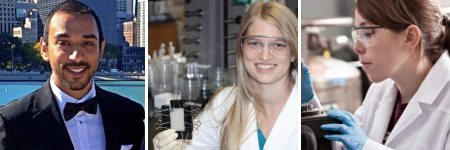 Three graduate students from the Department of Biomedical Engineering at Texas A&M University have been recognized for their poster presentations at the 2016 Texas Biomaterials Day, hosted by The University of Texas at San Antonio.
Three graduate students from the Department of Biomedical Engineering at Texas A&M University have been recognized for their poster presentations at the 2016 Texas Biomaterials Day, hosted by The University of Texas at San Antonio.
Faraz Jivan, Kristen Means and Lindsay Woodard each notched honors at the symposium’s poster competition for their respective research projects.
Texas Biomaterials Day is an annual, one-day symposium that includes keynote lectures by national-level biomaterial scientists and engineers. The event provides academic and industrial researchers the opportunity to showcase ongoing research in the region, facilitate the exchange of knowledge, and promote scientific collaborations among institutions and industries in Texas. In addition, students present their work through rapid-fire presentations and poster sessions.
Jivan, who works under the direction of Assistant Professor Daniel Alge, was recognized for his research poster titled “Bioorthogonal Conjugation of Bioactive Proteins to Thiol-Ene Click Microgels.” The method he is developing for incorporating proteins into injectable polymer particles could be broadly useful, Alge says, noting that future applications will focus on delivering therapeutic proteins to stimulate and guide tissue regeneration.
Means, who is advised by Associate Professor Melissa Grunlan, won a poster award for her research titled “Ultra-Strong, Thermoresponsive Double Network Membranes for Implanted Glucose Biosensors.” The membranes she is helping develop exhibit key properties such as high glucose diffusivity, high strength, cytocompatibility, and "self-cleaning" capabilities – all of which are essential for creating a long-term implantable glucose biosensor.
Woodard, who also is advised by Grunlan, was recognized for her research poster titled “Self-fitting” Shape Memory Polymer Scaffolds for Cranial Bone Defect Repair." Working in Grunlan’s lab, Woodard is developing a shapeable biomaterial that can serve as a fitted scaffold to aid in the repair and healing of cranial defects. – gaps in bone occurring in the head, face or jaw areas that are caused by injuries, birth defects or surgical procedures such as the removal of tumors.
About the Department of Biomedical Engineering
Committed to solving the world’s greatest health problems through the exploration of new ideas, integrated research and innovation, the Department of Biomedical Engineering at Texas A&M is producing the next generation of biomedical engineers, developing new technologies and new jobs, and achieving revolutionary advancements for the future of health care. The department has unique strengths in regenerative engineering, medical augmentation, molecular diagnostics/theranostics, tele-health, and precision medicine, and its faculty members are internationally recognized with collaborative relationships that span engineering, physical and natural sciences, medicine and veterinary sciences.